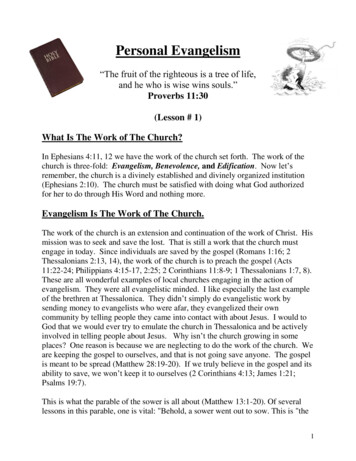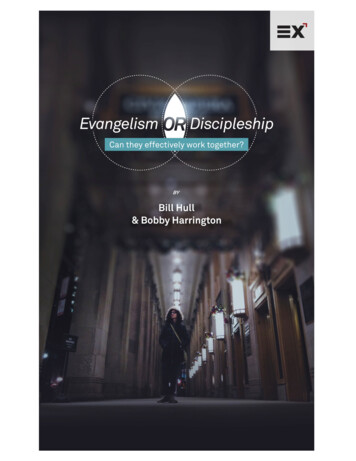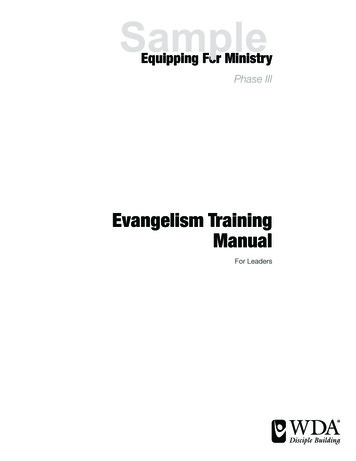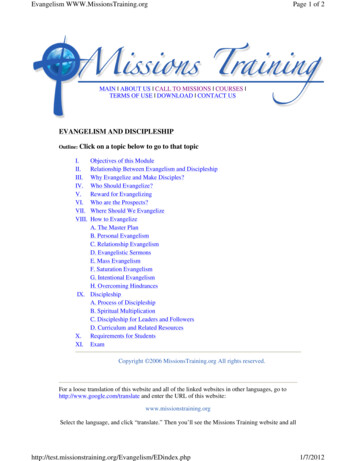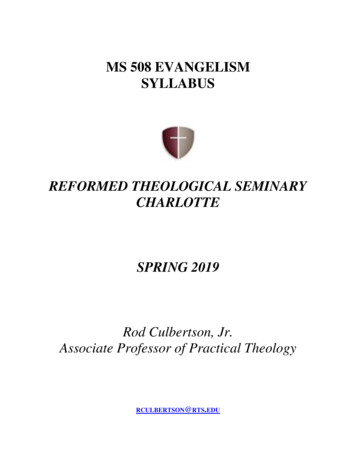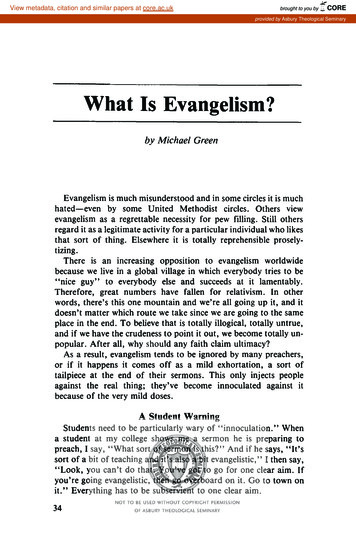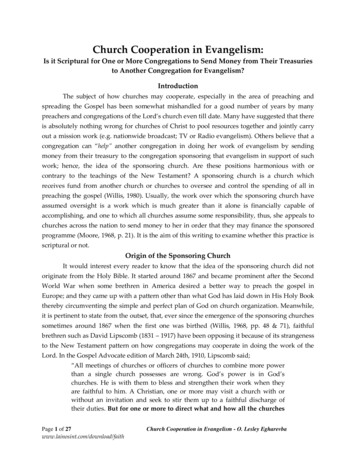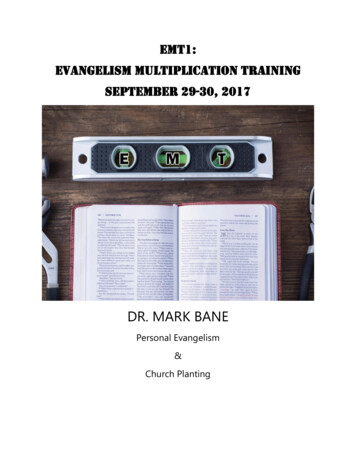
Transcription
EMT1:Evangelism Multiplication TrainingSeptember 29-30, 2017DR. MARK BANEPersonal Evangelism&Church Planting
THE GOAL OF TRAINING1.2.To release, encourage, inspire and equip multiplication on a micro and macro level. Acts 1:8 Teaches us that release is our primary need. John 14:12 Those who believe. Not those who have assertive personalities. Spirit is commondenominator. James 5:17 Person like us. Acts 4:13 Ordinary.Designed to equip and liberate the average Christian to disciple pre-Christians. The ultimate goalin becoming mature believers who assist local churches to multiply.INTRODUCTIONThis training is based on five basic principles found throughout the Bible and Christian history.1.2.3.4.5.The Know Principle: Knowing God intimately and hearing from God clearly is essential to doingHis will.The Mission Principle: The Mission of Christ provides purpose and fulfillment to the Christian life.Without mission, we become ingrown.The Go Principle: Going to a world of hurting people is the natural outflow of relationship withGod. If we don’t go we can’t be obedient.The Do Principle: The best evidence we love God is that we do as He says.The Trust Principle: Trust is essential to accomplishing the will and call of Christ. Without trust, it isimpossible to please God.INTERACTIVE #1Let’s begin by making two lists:1.2.Name five people who are at some level connected to you, but do not know Christ.Identify two communities that, in your mind, need a church.SESSION #1The Know Principle: Knowing God intimately and hearing from God clearly is essential to doing His will. If you don't know God you will not do what He wishes.Knowing God personally is the foundation of everything we do.Jesus often withdrew to pray (Luke 5:16)If Jesus needed it, we must do it too! (James 5:13a and 16b-18) Jesus was able to handle the cross because He spent the night dying in the garden.Many Christians are playing injured, limping in service, because they are serving behind and notpraying it forward.Knowing God gives Him influence with you. Knowing you gives you influence with Him. God knows what is coming.He knows when a person is ready to respond to the Gospel.He knows where churches need to be established.He knows who is prepared to start them.He knows how to prepare us to do the work.Sweet Hour of Prayer
Philippians 4:6-7 (NIV)“Do not be anxious about anything, but in every situation, by prayer and petition, with thanksgiving,present your requests to God. And the peace of God, which transcends all understanding, will guard yourhearts and your minds in Christ Jesus.”Four Stages in the Sweet Hour of Prayer, each stage lasts 15 minutes:1.2.3.4.Don’t be anxious.a. The Noise Stageb. Write down distractions to deal with later.With prayer & thanksgiving.a. The Praise Stagei. If you woke up this morning and found that you only had left what you praisedGod for yesterday, what would you have left?ii. One of the reasons we don’t praise is because we tend to complain. I foundsomething that might help with the tendency to complain. (Complaint ZapperVideo https://www.youtube.com/watch?v tNXk4ozwH s )b. Acknowledging that all good things come from God.Present: Let it go.a. The Request Stageb. IntercessionReceive: Listening time.a. The Listening Stageb. Peace that transcends understanding.Gratitude Quotes: Gratitude turns what we have into enough.“Silent gratitude isn’t very much use to anyone.” Gertrude Stein“Some people are always grumbling because roses have thorns; Iam thankful that thorns have roses.” Alphonse Karr1 Thessalonians 5:18 “Give thanks in all circumstances; for this is God's will for you in Christ Jesus”“What if you woke up tomorrow with only the things you thanked God for today?”The only thing that prevents praise is complaining.INTERACTIVE #2Please take the next 20 minutes to practice this method of intentional prayer. Write down your reflectionson page three of the student guide.Noise (5 mins); Praise (5 mins); Request (5 mins); Listen (5 mins)CLOSINGPlease try the “Sweet Hour of Prayer” in the morning before Session 2 begins. Reflect on the following: What God said to me regarding my need and shortcomings in disciple making.What I learned about myself and my prayer life in this experience.SESSION #2A few questions to open this morning:1.How many of you are a product of an evangelism effort?
2.3.4.How many of you are a product of a church plant?If your parents had not had children, what quality of life would you have?If you have been a Christian for three years, please stand.The Mission Principle: The mission of Christ provides purpose and fulfillment to the Christian life.1.2.3.Without mission, we become ingrown.Prayer leads to mission.Consider Acts 13:1-4 and following.a. When they prayed, they were sent out.b. We as Christians are identified as sent out onesAccording to Acts 1:8, where are we sent?1.2.3.4.Jerusalem (Micro)Judea (Macro)Samaria (Marginalized)The Ends of the Earth (World)Video Reflection on Sully (2016) https://youtu.be/mjKEXxO2KNE1.2.3.4.5.6.Is it possible our entire Christian lives could be judged by 208seconds?What will you do with your many 208 seconds?a. “40 years in the air, but in the end, I will be judged on 208 seconds.”The most important number in the Bible is zero.a. 2 Peter 3:9b. Matthew 18:14God is wooing every lost soula. John 6:44What is my part?a. Romans 10:14b. I Cor. 3:16Every believer must be involved with winning the lost to depopulate hell!a. How committed are we to getting one more until they are all in.b. No one left behind! (Hacksaw Ridge Video Clip)Things we need to do to properly focus on mission. Define a mature believer.Define the church culture.Focus on what matters to God.Why did He come? Illustration of Mission andwhat might happen if wedon’t pursue it. The BMWfactory: We take a nice tour ofthe factory, see all the fancyequipment, and then you askto see some of the cars theymade. “Oh, we don’t makeany cars—but isn’t the factorybeautiful? All the fancyequipment, shiny floors, bigwindows, and look at thatlunch room!”Luke 19:10For the Son of Man came to seek and to save the lost.I believe our problem is not:
That we don’t understand what we should be doing.That we think it is really someone else's responsibilityThat we assume lost people don’t matter to God.That we don’t want to help in depopulating hell.I believe our problem is: That we don’t trust Jesus when he tells us, “I tell youthe truth, ‘Anyone who has faith in Me will do thethings I do. He will do even greater things than thesebecause I am going to the Father.’” John 14: 12(Jesus, I Don’t Trust You Videohttps://youtu.be/qhnRvb-M-P4 )INTERACTIVE #31.Confession (10 Minutes): Take time to confess to othersyour possible sin of omission in neglecting the lost.Mission (10 Minutes): Make a list of your mission field.See list in Session 1 and edit and update it.Transformation (10 Minutes): List (on page 7 of yourstudent guide) what you can do differently to impactthe mission field, both micro and macro.2.3.NOTES: Matthew 27:51 “ the curtain ofthe temple was torn in two, from top tobottom ”You are God’s temple, God’s Spirit dwellsin youOld Testament vs New Testament Idea.God has convicted me. Many things cametogether at the same time while at AtlantaFirst. Jerry Falwell’s bio. Prayed, walked outof service with over 1,000 in attendance.It sounds very bold and brash to speak thething I am about to speak. I believe,knowing what I know about the missionfield, that every pastor, DS, Christianleader, and every individual believer ispersonally responsible for lost people. Ibelieve there are people in our lives thatwill end up in Hell because we did andsaid nothing.SESSION #3The Go Principle: Going to a world of hurting people is the natural outflow of relationship with God. If wedon’t go we can’t be obedient.Examples: Nike and their mission statement.The “priesthood of all believers”Mission for every believer and Nazarene: To make Christlike disciples in the nations.It is crazy that the most natural things we do are difficult in the beginning. Like breathing, walking, oreating. We didn’t stop breathing, walking, or eating because we were not good at it. Why doesn’t thelogic work regarding the one thing that God intended us to do as His people?So why don’t we do the evangelism we all know we should? We tend to be creatures of habit.The problem is we can be selfish.Let’s watch a few videos that remind us of how the Church should “not” function.(Me Church video https://youtu.be/cGEmlPjgjVI and It’s All about Me Worship CD videohttps://youtu.be/8XHkMPA1334 )Although it may seem strange to us, reaching the lost was the normative mission of the New Testamentchurch.The first thing Jesus said to the disciples. Matthew 4:19And he said to them, “Follow me, and I will make you fishers of men.”The last thing He said.
Matthew 28:19Go therefore and make disciples of all nations, baptizing them in the name of the Father and ofthe Son and of the Holy Spirit.The activity Jesus identified as consistent with the coming of the Spirit in Acts 1:8 was to be witnesses!The New Testament is characterized by three major events: (GRAPHICS GO WITH THESE POINTS)1.2.3.Jesus went up.The Spirit came down.The church went out.Without discipleship, we lose our identity. It is one of the things that makes all Christians uniquelyChristian. Make Christlike disciples. It’s what we Christians do! Once when I went to Arby’s They had no sauce. I went back the next week and they had no roastbeef!Discipleship is to the believer and the church as roast beef is to Arby’s.The call to witness is inclusive. Consider Nike. What is the Nike Vision statement? “To bring inspiration andinnovation to every athlete in the world. IF YOU HAVE A BODY, YOU ARE ANATHLETE!”Get this, Christian: “If you have the Spirit, you are a disciple maker.”This text is such a joy to study MATTHEW 9:35-37Jesus went through all the towns and villages, teaching in their synagogues, proclaiming the goodnews of the kingdom and healing every disease and sickness. When he saw the crowds, he hadcompassion on them, because they were harassed and helpless, like sheep without a shepherd.Then he said to his disciples, “The harvest is plentiful but the workers are few. Ask the Lord of theharvest, therefore, to send out workers into his harvest field.”It reemphasizes our mission as Christiansour mission as local Churchesour mission as a movementHe went through the towns: He was doing the work and recognized the task was too large for one man.He deputizes all his disciples to help, because the job is too difficult alone. This was Jesus! How muchmore do we need help in accomplishing the mission?Jesus had compassion: This is the pain of love. Compassion is a very strong Greek word – a gut reaction.What does it do to us when we see the crowds?He recognized the need: To get the harvest. The harvest is plentiful and ripe.We tend to see the harvest field as a place where we can enhance our image, reputation, andpersonal desires.He recognized the need: workers in His vineyard.
An occupation for common people. (Acts 7:57-58. Stephen and Phillip)An occupation with massive need. (2 Peter 3:9 The Lord is longsuffering to us, not willing for anyto perish, but that all should come to repentance.)An occupation with much assistance. (Matthew 28:20 “And surely I am with you always, to the veryend of the age.”)An occupation requiring little skill. (Acts 4:13 unschooled and ordinary.)An occupation difficult to do wrong. (Only one Hell! No hell #2! Story: Steak and egg kitchen)An occupation requiring much work. (He didn’t say pray for worshipers or congregants orbuddies—the prayer here is for workers! That is people who will work!)He asks us to pray for workers. Not pray for the harvest.Not pray for resources to harvest.Not for facilities to store the harvest.The need here is for workers – that is us!He deputizes them all.Again, Jesus takes us back to PRAYER, the one thing that, without it,we will fail. How many of us pray for our lost loved ones? Are therepeople here others are asking God to send someone to?Do we realize God uses our prayers and the cries of the lost toreach the world ?Psalm 34:15 The eyes of the LORD are on the righteous, and his ears are attentive to their cry.(William Booth video: dark and stormy ocean full of people drowning https://youtu.be/xsEKJTc8wkA)Remember the Know Principle:1.2.3.4.5.6.7.Be friendly (Phillip and Ethiopian; Jesus and Matthew; Mollee from Albuquerque; Steve theMechanic)Be complimentaryBe hyperaware. People are always watching, even in tough times.Be hypersensitive to the Spirit. (Paul and Macedonia)Trust God (Sherri Schilling)Be bold.Release the results to the Spirita. Philip: Spirit took him away “suddenly.” (Acts 8:26-40)b. Jesus returned to the Father after three years.INTERACTIVE #4Break up into teams of three.Two are visitors. One person has not yet decided to follow Christ. Be creative and really play a role in thisinteractive. Take 10 minutes and do this interactive. Return and share what you discovered.SESSION #4The Do Principle: The best evidence that we love God is that we do what He says.
Thoughts on the DO principle: Our job is to make disciples.His job is to build the Church.God is preparing windows of opportunity “now” for every person on the planet. Do we go?Do we speak?Do we keep silent?Do we expect?Do we trust?Some ideas to stimulate our thinking in that direction:A. Establish His vision and mission goals for your Church and community. MAP. Measurable goals you are committed to accomplishing, with the help of God. Here are my goals: Pray, work towards, and expect to present the Gospelto someone every week. Adel: Why she came to me? At Zios restaurant in Springfield Missouri. Questions I asked o What is important about the timing?o Why would she come to me?o What options does God have?B. Provide opportunities for unsaved people to come to Christ in safe environments, like the churchproperty, while you are training them to be disciple makers. Four examples: Baptisms on Sunday morning. Dedications on Sunday morning. Weddings on Sunday morning. Marriage renewals on Sunday morning.C. Exegete your community: What are the people like, what are their needs, what do they lack, what dothey have, how many have children, what are their activities, where do they hang out, where are theyfrom, and how many don’t know Jesus?D. Offer help and participation: Provide what they need, Presence: go where they gather and be one of them. Power: Trust the power of the gospel to change lives. Present: Be more interested in getting them in the kingdom (Jesus’ disciples don’t need to beforced to come to church) than in your church. The easiest person to disciple is one who has hadan authentic experience with Jesus.E. Challenge and expect people to start a mission outpost. (Tyler and Tamera Nelson, John MariePhilipie, Ken (Houston,) Chris and Kelley Diller, The Well.)F. Get on our knees.G. Get out of our office.H. Get busy! Work, Sow seed.Mission Action Plan (MAP)1.2.3.4.What will I DO (habits and behaviors) that will make my life different?How will my prayer life change?How will my mindset change in a missional way?What actions will I take to live a more missional life?
SESSION #5The Trust Principle: Trust is essential to accomplishing the will and call of Christ. Without trust, it isimpossible to please God. Do we trust that prevenient grace has preceded us?Do we trust that the Holy Spirit will be with us as we speak?Do we trust the Holy Spirit with those we minister to after we have left?I have had to trust God with my Church plant.Let me introduce you to some of my encounters.
Evangelism Multiplication Training September 29-30, 2017 DR. MARK BANE Personal Evangelism & Church Planting . THE GOAL OF TRAINING 1. To release, encourage, inspire and equi

